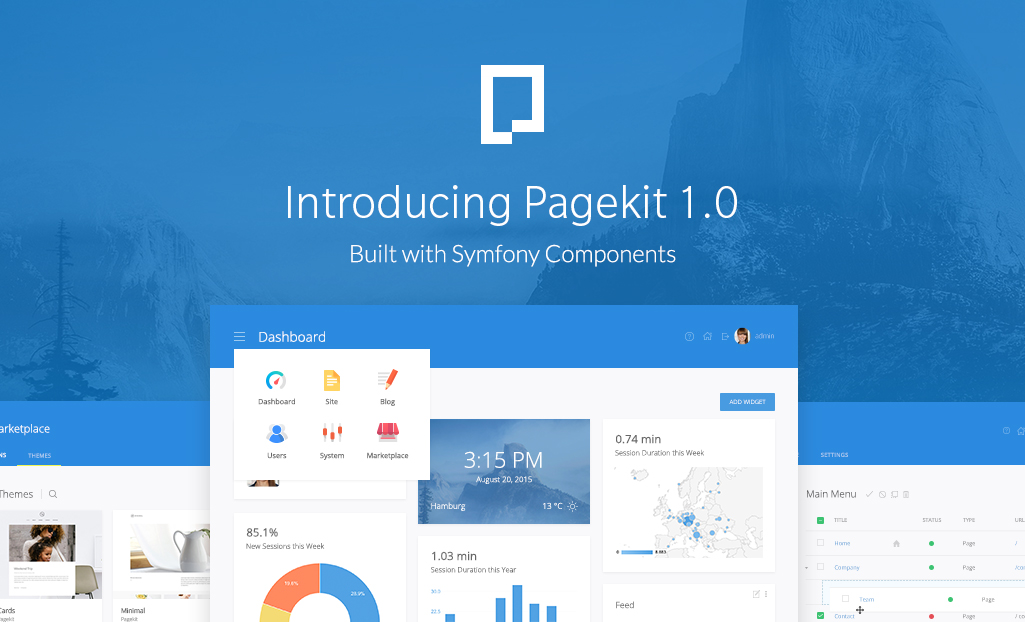Pagekit, an Open Source CMS built with Symfony Components

Pagekit is an Open Source CMS built with several Symfony Components. Recently we had the opportunity to meet with Jan Schönherr, one of its lead developers, and we talked with him about Symfony and Pagekit. Below you'll find the transcript of our interview.
Could you start by telling us a bit about yourself. Who is behind Pagekit?
Hi, my name is Jan. I'm one of the lead developers from YOOtheme, the company behind the Pagekit project. YOOtheme is a world leading WordPress and Joomla theme and extension provider. We are a young company with 15 team members working in the middle of our home port Hamburg.
What is Pagekit and how is it connected to Symfony?
Pagekit is an open source CMS built on top of Symfony components. We tried to find a modern solution for the old problem of easily managing your content on the web. For that we needed a strong and flexible foundation. That's why we started off by building a lightweight framework, which provides the basic functionality to build most web applications. The underlying base for that framework are those Symfony components.
Pagekit comes with an integrated marketplace to make one-click install of extensions and themes possible. Developers can distribute their own products through the marketplace. Just like Symfony, Pagekit is released under MIT license, without any restrictions. Developers can decide whether they want to use MIT, GPL or any other license for their themes and extensions. It is hosted on Github and open for everyone to contribute.
What is your motivation to create Pagekit and who are you building it for?
When we think about our users, we think about both developers and the actual end users who will be working in the admin interface. Developers with a Symfony background will feel right at home when building their projects with Pagekit. They can see Pagekit as a starting point for their projects – a powerful app builder that comes with a big set of extensions and themes, available right from the integrated marketplace. As for the end users, we try to build Pagekit for everyone to use. The admin interface doesn't require any expert knowledge and the supplied apps like blog, static pages and so on will feel easy to use for anyone who has been working with other popular CMSes before.
Why did you choose to use Symfony?
What we liked most about Symfony was the modularity of the components and that we could use them individually. That struck us as a difference to other frameworks we've looked at, which had more inner dependencies and a more monolithic approach. We picked the Symfony components that were most suited for Pagekit, but chose not to use the full Symfony stack. For tasks that were very specific to Pagekit's requirements (like dynamic route configuration), we created our own components and modules, following what we appreciated about the Symfony project. As a nice side-effect, choosing Symfony opened up a huge community of developers to us.
What kind of feedback are you receiving from the community?
The feedback from the community has been really good so far. Ever since we've announced Pagekit, we realized that a lot of people are actually looking for exactly what we are building. From the beginning of the project, and even more so in the beta phase, we have seen a lot of activity and feedback on Github. The Pagekit repository has over 2.400 Stargazers and over 20.000 developers signed up on Pagekit.com. We were lucky to attend SymfonyLive events in London and Berlin and presented our progress to the community. Our demo installation in particular received very positive feedback. We are happy to see people getting along with the simple user interface we haven chosen for the admin area.
What will be next for Pagekit?
Now that Pagekit 1.0 has been released, we will gather all the feedback from the community and work on some minor releases to improve Pagekit. There are a number bigger tasks, like custom fields, multi-language or taxonomies, which have to be tackled now. If you are interested in contributing, you are welcome to join in on the discussion on Github. We are also excited to find out what extensions developers will come up with in the marketplace. If Pagekit has caught your interest, check out our YouTube tutorial channel.
About us
What a Symfony developer should know about the framework: News, Jobs, Tweets, Events, Videos,...
- Welcome to Symfony News !
- More About us
- Contact us on contact[at]symfony-news.com
